
3.3 Recreating the Same Position after a Pass (2)
|
Let us start be considering whether to allow recreation of a former position immediately after a pass. In Dias. 3-4-1 to 3-4-4, after White 64 to 72, Black has a clever move at 73. White plays 74, Black plays 75, and White plays 76, taking two stones. Black recaptures at 77 and White passes. Now if Black is allowed to recreate a former position immediately after a pass he will play 79 in Dia. 3-4-5, creating the same position as in Dia. 3-4-3, and White will be unable to recapture because that would recreate Dia. 3-4-4. The white group in the bottom left therefore dies what will probably be regarded as an unnatural death. |
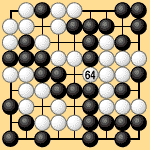 |
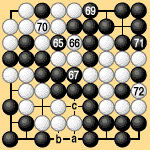 |
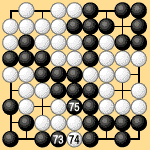 |
| Dia. 3-4-1 prisoners: white 2 |
Dia. 3-4-2 68 connects at 65 |
Dia. 3-4-3 |
|---|---|---|
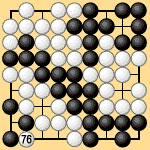 |
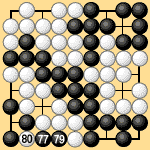 |
|
| Dia. 3-4-4 | Dia. 3-4-5 78 passes |
|
What if both players are permitted to recreate one former position after a pass? Then White is allowed to repeat the same position by recapturing Black 77 and 79 with 80 in Dia. 3-4-5, and now it is the black stones in the bottom left that get captured. As a related problem, suppose Black plays 'c' in Dia. 3-4-2, and the game continues as in Dia. 3-4-6. After White 78 passes, Black is losing. If both sides are allowed to recreate one former position after a pass, Black will play 79 at 75, White will capture, and so on into infinite cyclic repetition. In each cycle Black loses two prisoners and White loses one, but under area rules this does not change the score because prisoners are not counted, so the cycle will continue forever. |
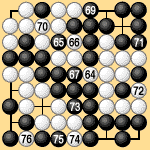 |
| Dia. 3-4-6 68 connects at 65, 77 captures 76, 78 passes, 79 at 75, 80 captures at 76. |
|---|
